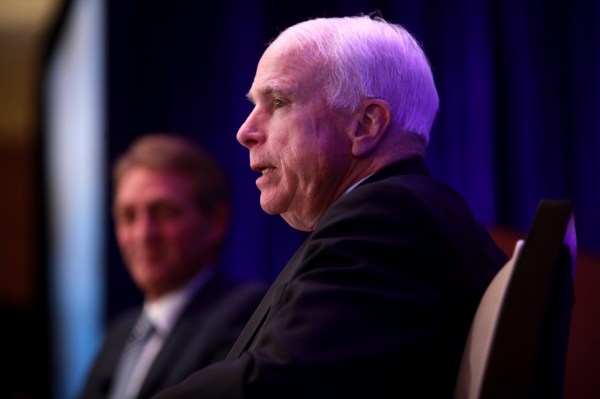A new bipartisan bill known as the Honest Ads Act is the first major attempt to regulate online platforms that sell ads with rules akin to those that apply to more traditional advertising on TV, radio and in print.
The bill, introduced today by Democratic Senators Mark Warner and Amy Klobuchar, with a bipartisan boost from Republican Senator John McCain, imposes regulations on social platforms, websites, ad networks and other online entities with more than 50 million unique users per month.
As the bill’s announcement states:
Russia attempted to influence the 2016 presidential election by buying and placing political ads on platforms such as Facebook, Twitter and Google. The content and purchaser(s) of those online advertisements are a mystery to the public because of outdated laws that have failed to keep up with evolving technology. The Honest Ads Act would prevent foreign actors from influencing our elections by ensuring that political ads sold online are covered by the same rules as ads sold on TV, radio, and satellite.
Disclosures for ad financing would apply to any entity that purchases more than $500 in ads cumulatively across a platform, a fairly low threshold for disclosure that speaks to the potency of even small ad buys on platforms like Facebook. The bill would also place a “reasonable expectation” on social media companies to identify if the source of an ad buy is outside the U.S.
“There will always be a case where things can fall through the cracks. What we’re trying to do here is start with a light touch,” Warner said. “We don’t want to slow down innovation on the internet, we don’t want to slow down technology.”
As the top Democrat on the Senate Intel Committee, Warner has had a front row seat to the revelations around Russian interference in the 2016 U.S. election.
In their press conference announcing the bill, the senators noted that Google and Facebook command 85 percent of online political ads. “Who wouldn’t want to know if the ad appearing next to your story was being paid for by a foreign power?” Klobuchar asked.
Its creators hope that the bill can make its way through Congress before primary season begins, fending off or at least complicating further attempts by the Russian government to seed divisive political ads online.
Warner admitted that while the bill is a good start, it will still be difficult to identify accounts that are “misrepresenting themselves” to conceal where the money comes from.
Calling the identity piece “much tougher,” Warner admits that he is “hoping that these platform companies come up with some ideas” for tracing and attributing political ad purchases.
Sen. Klobuchar noted that tech companies may not be enthusiastic about facing increased regulation, but they have become increasingly cooperative after their initial reticence to admit fault.
“Now the online companies, we’re working with them,” Klobuchar said. “I’m not going to tell you they support this bill right now. They have to realize that the world has changed, they have been selling ads and making money off of this system.”
Even as they skewered Facebook for being “dismissive” early on and Twitter for essentially copying Facebook’s homework in its report to Congress a few weeks ago, the lawmakers appeared hopeful that cooperation would only improve as the depth of Russian election interference becomes more widely understood.
In spite of that increasing cooperation, the senators suggested that voluntary adherence to Congressional guidelines would be an uneven solution at best.
“The problem is, it has to cover everyone — you can’t just have a few companies doing it voluntarily, it has to be in the laws,” Warner said.
“These companies rely on the trust of users,” he added. “It’s in their own self-interest.”
Facebook, Twitter and Google are expected to appear in an open hearing before the House and Senate’s intelligence committees on November 1. Facebook and Twitter confirmed this week that they will not be sending high-profile executives to the hearings, instead opting to be represented by their general counsels.
“I think that they got the message,” Warner said. “I think the real proof in the pudding will be ‘come to the hearing on November 1.’ “
